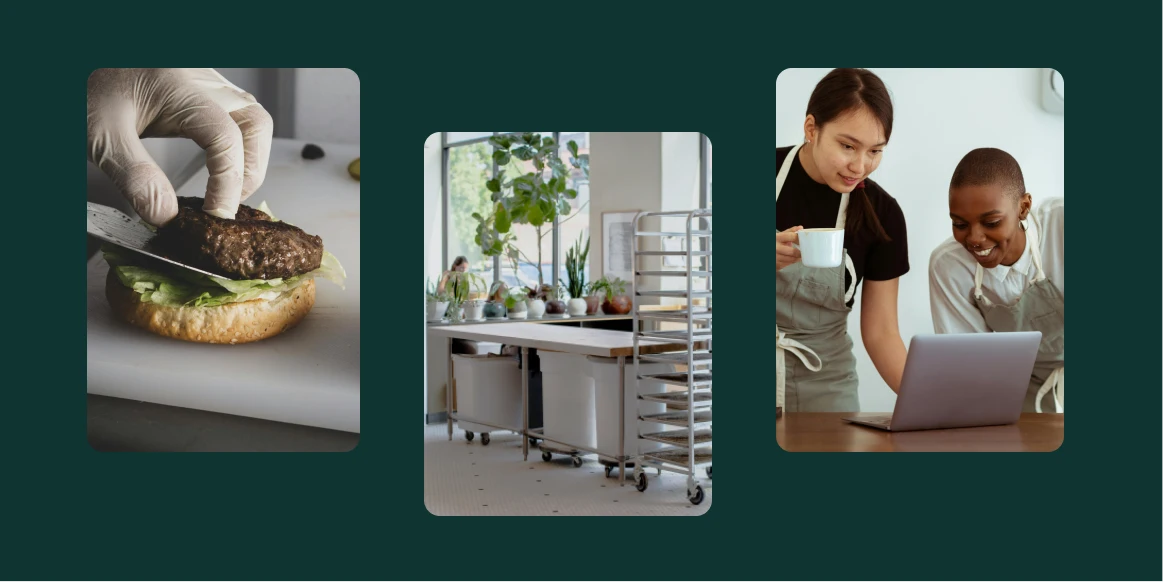
TL;DR
- Shared commercial kitchens provide affordable, licensed space that lowers the barrier to entry for food entrepreneurs.
- They create a collaborative environment where culinary professionals can connect and share resources.
- Flexible scheduling and access to specialized equipment help members grow their businesses efficiently.
What if we told you that shared commercial kitchens were one of the original offerings in the flex space industry?
This creative model offers a cost-effective and accessible way for food entrepreneurs to get their business off the ground and expand into larger operations – and it’s been around for years.
In this deep dive, we’ll explore what a shared commercial kitchen is, who they’re best for, and how they fit into the wide and wonderful world of niche coworking spaces.
- What is a shared commercial kitchen?
- How do commissary kitchens work?
- Who are commissary kitchens for?
- What is the history of shared-use kitchens?
- How are shared commercial kitchens shaping the food industry today?
- The top benefits of shared-use kitchens
- How are coworking and shared kitchens similar?
- What technology can you use to run a shared kitchen facility?
- What are some examples of shared commercial kitchens?
- Business models for shared kitchen success
- How can I structure my shared kitchen membership plans?
What is a shared commercial kitchen?
Shared commercial kitchens, also known as commissary kitchens, are professional-grade cooking facilities where food entrepreneurs can start and grow their business.
They offer access to specialized equipment at an affordable cost and are regulated by local health and safety laws, making them a great choice for those who need access to a commercial kitchen, but don’t want to invest in their own.
Today, the global ghost kitchen market is valued at USD 63 billion in 2023, expected to grow at a ~13% CAGR to reach USD 160 billion by 2030 according to Statista, making shared kitchens big business.
How do commissary kitchens work?
If you’re looking to create a commissary kitchen, here’s how it might work:
- Operators offer hourly, daily, or monthly rental options so businesses only pay for the time they need
- Tenants have access to commercial-grade appliances, prep stations, refrigeration, and storage, reducing the need for large equipment purchases
- The kitchen operator maintains necessary health and safety certifications, allowing each member to produce food legally without securing their own facility license
- Kitchens use booking software (like Optix) to manage time slots, prevent conflicts, and optimize utilization
Some commissary kitchens function as incubators, offering mentorship, marketing support, packaging resources, and connections to distributors or local retailers. For food trucks, caterers, bakers, and ghost kitchens, commissary kitchens remove the biggest barrier to entry: upfront cost.
Get your free guide to a thriving shared kitchen.

Who are commissary kitchens for?
Commissary kitchens are best for small-scale food businesses or entrepreneurs that are looking to take their business to the next level.
Here are some of the more popular members of shared commercial kitchens:
- Small-scale food producers (bakers, chocolatiers, artisanal food makers) who need a licensed kitchen to produce and package their goods
- Entrepreneurs and startups that are looking to launch a food business but aren’t able to invest in their own commercial kitchen facility
- Food trucks and mobile food businesses that need access to a licensed commercial kitchen to prepare food
- Catering companies that require additional kitchen space for large events or their expansion
- Pop-up restaurants that want to test out new concepts or hold temporary events
- Nonprofit organizations and community groups that want to provide access to licensed kitchen space for food-related initiatives and programs
The affordability and accessibility of shared commercial kitchens make them the ideal place for food businesses of all kinds to learn from one another.
Want to run your shared kitchen more efficiently? We got you.

What is the history of shared-use kitchens?
Shared commercial kitchens have been around for several decades, but have grown in popularity in recent years thanks to the rise of entrepreneurship. Let’s take a brief look at the history of these shared spaces.
1. The first shared kitchen facility opened in the 1960s.
They were primarily used as a way for small-scale food producers to access licensed and inspected commercial kitchen space without having to invest in their own facilities.
2. The next evolution of commissary kitchens came in the 1990s.
Shared kitchens began to expand as a business model, with private companies establishing commercial kitchens that could be rented out to food businesses. They were usually located in urban areas and were used primarily by catering companies or food trucks.
3. Finally, there came the modern day commissary kitchens.
In the last decade, shared kitchens moved towards targeting budding entrepreneurs. Online platforms like KitchenShare began to connect food entrepreneurs with available kitchen space, making it easier to find and book commercial kitchen facilities on-demand.
Today, shared kitchen facilities are a common feature of the food industry, with hundreds of facilities located across North America.
How are shared commercial kitchens shaping the food industry today?
We write a lot about different types of shared “workspaces”, be it on the Optix blog or on other external sites like Coworking Resources. There are many things that these shared spaces all have in common, but one thing stands out – entrepreneurship.
At its core, shared spaces are enabling entrepreneurs to succeed across a wide variety of industries. Whereas once this was only limited to knowledge workers in coworking spaces, now it can be applied to so many different industries — including shared kitchens.
Commissary kitchens encourage more entrepreneurship in the food industry, empowering chefs to go out on their own without requiring extensive resources. In the U.S., over 50% of shared kitchen users are first-time food business owners showing just how embedded entrepreneurship is in the shared kitchen model.
While before, culinary entrepreneurs were largely dependent on large corporations or extensive capital to start a business, now they are free to operate independently at a lower price point. Considering renting a shared commercial kitchen can reduce upfront costs by up to 85% according to Food Corridor, it’s clear this trend is here to stay.
In turn, these kitchens make entrepreneurship more accessible, while promoting a more collaborative and sustainable food ecosystem.
The top benefits of shared-use kitchens
Much like micro-gyms and other coworking niches with specialized equipment, commissary kitchens offer professional-level, high-quality equipment and space at an affordable cost. Here are some of the benefits shared kitchen spaces offer their members.
They are affordable and cost-effective
If you want to sell sandwiches at your local Farmer’s Market, you are probably not ready to purchase your own food packing facility. However, you will need a professional space to work out of (it may even be legally required).
Much like other shared flex spaces, shared kitchen facilities serve as a more affordable alternative to investing in your own commercial kitchen facilities, as you only pay for the time and space you need.
They offer access to professional-grade equipment
Kitchen commissaries come equipped with high-quality appliances, utensils, and tools, all of which can be expensive to purchase and maintain as an individual.
They are health-code compliant, licensed facilities
As any food entrepreneur knows, health and safety is a big deal. At a shared kitchen facility, you can rest assured that you are working out of a space that is compliant, without you needing to worry about it.
They are also fully licensed and inspected by health authorities, providing entrepreneurs with the necessary permits and certifications to operate legally. This can be a huge selling feature for those just getting their businesses off the ground.
They provide a sense of community
Entrepreneurship is a lonely journey, with nearly 30% of entrepreneurs struggling with feelings of isolation. When you’re building your own business from the ground up, having a community of people who are on a similar journey can go a long way.
Shared commercial kitchens provide opportunities for food entrepreneurs to collaborate, network, and share knowledge, ideas, and resources. In that sense, they are very similar to coworking spaces that also place an emphasis on community.
The advantage here is that everyone in a shared commercial kitchen is working in the food industry, so learning can happen faster. This is one of the key benefits of niche flex and coworking spaces according to Steve Krueger, Founder at niche coworking community ECOMsquare. Hear more of his thoughts below.
They allow for flexible scheduling and membership opportunities
With a shared space, memberships are typically flexible enough that members are not tied down to using it on a set schedule or at specific times of the day. This enables members to use the space on a part-time or as-needed basis, making it a much more affordable option than what would traditionally be available.
For these reasons, commissary kitchens are the ideal choice for small-scale food operators looking to get their business off the ground.
How are coworking and shared kitchens similar?
At Optix, we like to think about how the coworking business model can be applied across a variety of different industries, from fitness to golf simulators.
Shared-use kitchen facilities borrow from the coworking model by selling space and community. This means the primary way that shared kitchens make money is by selling access to the space, equipment, and resources that someone needs in order to be successful.
Selling space isn’t the only thing commissary kitchens and coworking spaces have in common. Here’s a list of a few more things they share:
- Cost-effective for entrepreneurs to grow their businesses
- Rely on shared resources
- Offer flexibility
- Encourage collaboration and community-building
- Benefit from coworking space software like Optix
It’s no wonder then why the two concepts go hand-in-hand.

What technology can you use to run a shared kitchen facility?
When setting up a shared-use kitchen space, you may be wondering what type of technology would be best suited to run it. We often hear from our clients that they love Optix because it is flexible enough to fit a wide variety of business models and needs – including kitchen spaces.
You can use Optix to:
- Keep track of who’s using what workstation, when their invoice is due, and what equipment they’re using—all from a single dashboard
- Optimize revenue generated by your kitchen coworking space by keeping track of space usage and scheduling to ensure maximum efficiency and utilization
- Bring together individuals passionate about food and cooking by leveraging Optix’s Directory and Messaging features
Best of all, you can use Optix coworking software to automate all the parts of your kitchen space that you don’t want to deal with, whether it’s following up with new leads or onboarding chefs into your space, Optix can take care of it all. It’s a powerful automation platform that can give you your time back.
Learn more about how Optix can run your shared kitchen business.
What are some examples of shared commercial kitchens?

Here at Optix, we support a wide variety of flex space businesses including a number of shared commercial kitchens around the world. Here are a few examples of shared commercial kitchens (and Optix clients!) who are shaping the food industry.
Communal Coffee
Communal Coffee is a one-of-a-kind co-roasting facility in Germany geared towards the needs of coffee roasters. Started by four entrepreneurs in the coffee industry, it is a one-stop-shop for anyone who needs a facility to get their local coffee business off the ground.
According to their website, members at Communal Coffee can enjoy pallet storage, the use of packing lines, and QC-lab time, as well as a free introduction to equipment and roasters, member events, and special prices with our sponsors. It is the ultimate option for anyone looking to develop their coffee roasting abilities to launch a successful business.
“Communal Coffee is by its nature a sum of its parts and a bit more. The communal aspect of CC will always keep us developing and moving forward.”
Atlas Kitchen USA
Atlas Kitchen USA is a beautiful shared-use kitchen facility located in Massachusetts. The well-equipped facility caters towards all culinary entrepreneurs including farmers market vendors, photographers, bakers, and more.
The space is licensed, certified, cost-efficient, and above all, fueled with passion by people who know and love the food and restaurant business.
“Our mission is to help grow your food business in a professional and collaborative, shared-use environment.”
Business models for shared kitchen success
Not all shared commercial kitchens operate the same way. Choosing the right business model is key to maximizing revenue, maintaining high utilization, and attracting the right mix of tenants. Here are some of the most common approaches for profitability:
1. Hourly rental model
- How it works: Members book kitchen time in hourly blocks, paying only for what they use.
- Best for: Food entrepreneurs with unpredictable schedules or seasonal production needs.
- Pros: Flexible for members, high potential to fill unused time slots.
- Considerations: Requires efficient scheduling tools to prevent overlap and downtime.
2. Monthly membership model
- How it works: Members pay a flat monthly fee for a set number of hours or unlimited access.
- Best for: Established businesses like caterers, meal prep services, or ghost kitchens that need consistent production time.
- Pros: Predictable revenue for the operator, stable kitchen occupancy.
- Considerations: May require contracts and minimum commitments to ensure profitability.
3. Dedicated station rentals
- How it works: Operators lease a specific workstation or prep area to a single tenant for exclusive use.
- Best for: Businesses producing high volumes or requiring specialized equipment setup.
- Pros: Provides members with consistency and privacy.
- Considerations: Less flexible—unused time in a dedicated station can’t easily be rebooked.
4. Kitchen incubator model
- How it works: Combines kitchen access with mentorship, business training, marketing assistance, and networking opportunities.
- Best for: Early-stage food startups seeking both facilities and guidance.
Pros: Creates a strong community, positions your space as a launchpad for success. - Considerations: Requires additional staff expertise and program structure.
Pro tip: No matter the model, leveraging automation tools like Optix for booking, billing, and member communications can significantly increase efficiency and profitability—often boosting utilization rates by 20–30%.
How can I structure my shared kitchen membership plans?
We know that seeing examples of membership plans for shared kitchens can be helpful. Though your miles may vary, here is one example of a membership plan at a shared kitchen facility that you can use as inspiration.
| Full-time membership access | 40 hr/wk | $2,300/mo |
| Part-time membership access | 20 hr/wk | $1,575/mo |
| Starter membership | 40 hr/mo | $1,025/mo |
Shared kitchens: the future of the industry?
As the popularity of entrepreneurship grows and more niche food suppliers enter the space (looking at you, co-roasting!) shared-use kitchens will continue to be an important platform for food entrepreneurship and a key driver of the industry’s transformation.
As with so many of these incredible flex space trends, we’re excited to see what the future has in store!
Are you looking to start a shared commercial kitchen? Want to learn how you can better manage your shared kitchen space with the help of software? Book a demo with a member of our team today to learn more about how Optix can help you make your day-to-day easier and more efficient.
Marketing Manager
Kelly Karn is the Marketing Manager at Optix coworking software. She's been covering the latest and greatest in the world of coworking for 4 years and is one of the leading voices in coworking content having written over 300 articles. You can find her work on Coworking Insights, Coworking Resources, Allwork.space, DeskMag, GCUC, and (of course) the Optix blog.
Frequently asked questions
A shared commercial kitchen—also known as a commissary kitchen or shared-use kitchen—is a licensed, fully equipped facility that multiple food businesses can rent. It allows entrepreneurs to prepare, cook, and package food in compliance with health and safety regulations without investing in their own space.
Shared kitchens are popular with caterers, food trucks, bakers, meal prep services, ghost kitchens, and emerging food brands. They’re also used by small-scale producers testing new concepts before scaling up.
Pricing varies by location, equipment, and rental model. Hourly rates can range from $15 to $50, while monthly memberships might run $300 to $1,500 or more. Some kitchens also charge storage or onboarding fees.
They reduce startup costs (by up to 85% compared to building a private kitchen), ensure regulatory compliance, and offer access to professional-grade equipment. Many also provide networking opportunities and business development support.
Most kitchens require members to have a business license, food handler certification, and product liability insurance. However, the kitchen itself usually holds the facility’s health department permit, simplifying compliance.
Operators generate revenue through hourly rentals, monthly memberships, dedicated station leases, and add-on services such as storage, training programs, or hosting events. Some also run incubator programs to attract early-stage food businesses.
Tools like Optix streamline scheduling, automate billing, manage storage allocations, and facilitate member communication, boosting utilization rates and reducing admin time.



